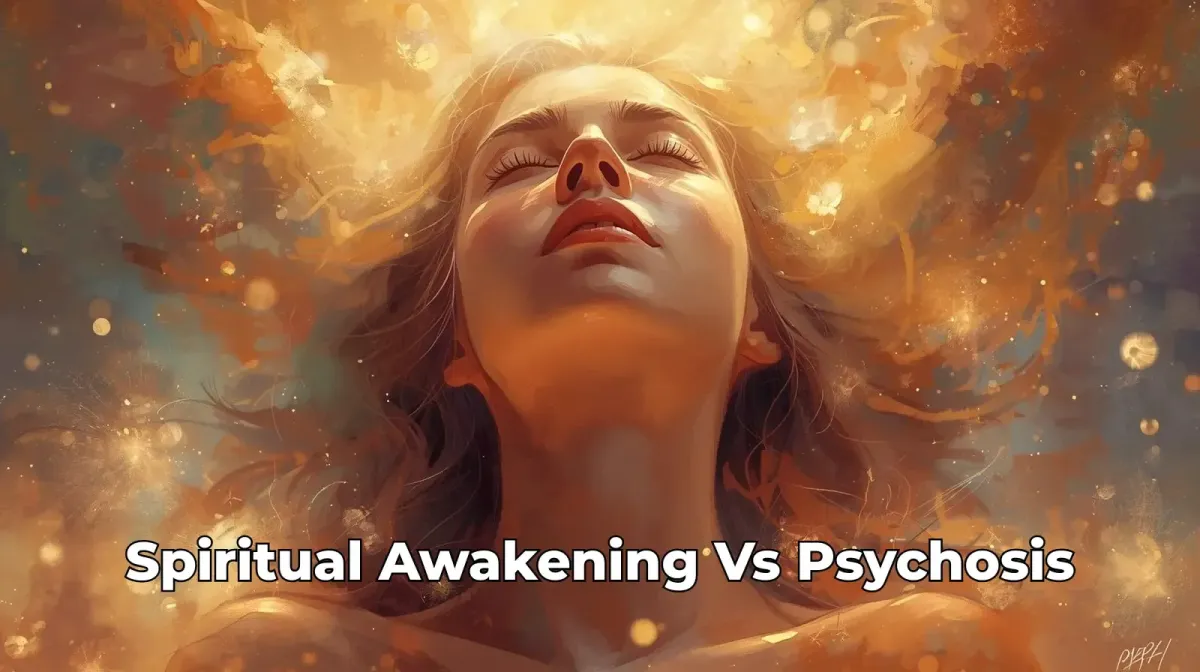
Spiritual Awakening vs Psychosis: Safety, Grounding, Help
One of the most confusing—and frightening—experiences is a sudden spiritual opening that overwhelms you. For some, it feels like bliss and union with the universe. For others, it feels chaotic, terrifying, or even destabilizing.
In these moments, people often ask: “Am I having a spiritual awakening—or am I losing my mind?”
This guide will help you understand the differences, the overlaps, and the safe steps you can take. We’ll explore:
What spiritual awakening is.
What psychosis is.
Where they overlap and diverge.
Why people confuse the two.
Practical grounding steps for safety.
When to seek professional help.
For the bigger picture, see Spiritually Lost? The Complete Guide to Finding Your Way.
What Is a Spiritual Awakening?
A spiritual awakening is a profound shift in awareness. Common features include:
A sense of oneness or connection to all things.
Insights into the nature of self and reality.
Increased compassion, empathy, and love.
A dissolving of old identities.
Awakening can be gentle, but often it’s turbulent—sometimes mistaken for crisis. See Spiritual Awakening or Existential Crisis? How to Tell.
What Is Psychosis?
Psychosis is a clinical term describing a break from consensual reality. Symptoms may include:
Hallucinations (hearing voices, seeing things not present).
Delusions (beliefs disconnected from reality).
Paranoia or disorganized thinking.
Difficulty functioning in daily life.
Psychosis requires medical attention. Unlike awakening, it disrupts safety, grounding, and functioning.
For clarity on when to seek professional help, see When to Get Help: Therapy, Coaching, or a Meraki Guide?.
Why They Get Confused
Awakening and psychosis both disrupt the normal sense of self and reality. In both, you may feel:
Disoriented.
Overwhelmed by unusual perceptions.
Alienated from those around you.
Flooded by meaning—or lack of it.
But the direction of travel differs. Awakening expands and eventually integrates. Psychosis destabilizes and fragments.
The Key Differences
Aspect Spiritual Awakening Psychosis Core Experience Expanded awareness, deeper connection Break from reality Emotions Awe, compassion, sometimes fear Fear, paranoia, confusion Integration Can be grounded with support Difficult without medical treatment Outcome Growth, wisdom, authenticity Risk of harm without intervention
Real Stories
Elena: In deep meditation, Elena felt her boundaries dissolve. It was overwhelming, but grounding practices helped her integrate. This was awakening.
Tom: After weeks without sleep, Tom began hearing voices telling him to act in dangerous ways. He required psychiatric care. This was psychosis.
Sarah: After grief, Sarah felt both expansion and terror. With support, she found this was a turbulent awakening intertwined with trauma. See Grief, Loss, and Feeling Spiritually Cut Off.
Safety First: Grounding During Overwhelm
Whether you’re awakening or facing mental health crisis, grounding is essential.
Practices for Awakening Overwhelm
Breathwork: Slow, deep breathing. See Breathwork When You Feel Spiritually Disconnected.
Embodiment: Gentle movement like Qi Gong for the Spiritually Lost: Ground, Centre, Reconnect.
Journaling: Anchor experiences with Journaling Prompts for Lostness, Doubt, and Dryness.
When Safety Is at Risk
If experiences are frightening, disorienting, or involve loss of touch with reality, it’s vital to seek medical guidance.
The Role of Trauma
Trauma can blur the line between awakening and breakdown. A dysregulated nervous system may amplify awakening into overwhelm. Learn more in Somatic Safety First: Regulating a Dysregulated Nervous System.
How to Support Someone Else
If a loved one is going through this, approach with:
Compassion, not judgment.
Practical grounding—walks, meals, routine.
Gentle inquiry, not confrontation.
Encourage professional support when safety is compromised.
When to Seek Professional Help
Seek urgent support if you or someone you know is:
Unable to distinguish reality from visions.
Experiencing paranoia or dangerous impulses.
Unable to care for daily needs.
Professional therapy or psychiatric support is essential in these cases. For broader support paths, see When to Get Help: Therapy, Coaching, or a Meraki Guide?.
Integration After Awakening
If your experience is awakening, the goal is integration. That means:
Grounding in body practices.
Building healthy relationships. See Relationships During a Spiritual Crisis: Boundaries & Repair.
Exploring meaning gently. See Shadow Work Without Overwhelm: A Gentle Path Back to Self.
On the Other Side
Those who walk through awakening with support often emerge with:
Deeper compassion.
A truer, freer self.
A spirituality grounded in love rather than fear.
Those who recover from psychosis can also find resilience, with the right treatment and support.
Taking the Next Step
If you are unsure whether you are awakening or in psychosis, the most important thing is safety. Ground yourself, seek help if needed, and walk gently.
As a Meraki Guide, I support people in turbulent awakenings—helping them ground, integrate, and move forward with compassion.
Book your Free Soul Reconnection Call to explore your next step.

I look forward to connecting with you in my next post.
Until then, be well and keep shining.
Peter. :)
FAQs: Awakening vs Psychosis
What is the difference between spiritual awakening and psychosis?
Awakening expands awareness and can be integrated. Psychosis is a break from reality that requires medical support.
Can awakening feel like psychosis?
Yes, awakening can feel overwhelming, even terrifying. Grounding and support are essential.
How do I know if I need professional help?
If you lose touch with reality, feel unsafe, or can’t care for daily needs, seek medical help.
Can trauma trigger awakening or psychosis?
Yes. Trauma dysregulates the nervous system, sometimes intensifying awakening into overwhelm. See Somatic Safety First.
Where can I find safe support?
Explore When to Get Help: Therapy, Coaching, or a Meraki Guide?.
